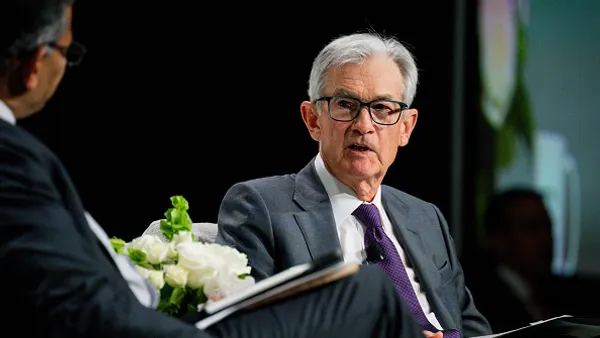Dive Brief:
- The Teachers Insurance and Annuity Association of America filed suit against several former executives of the failed Silicon Valley Bank in a California court over alleged losses the investors suffered due to a failure by bank leadership, including its ex-CEO Gregory Becker and former finance chief Daniel Beck, to adequately protect the financial services firm’s investments from the risk poised by surging interest rates.
- “SVB did not have a credible line of defense framework, the sine qua non of risk management for any banking organization, nor did it have in place up-to-date plans for contingency funding in times of stress or policies for managing interest rate risk,” the complaint filed Thursday in the U.S. District Court for the Northern District of California alleges.
- As well as Becker and Beck, the suit names SVB Chief Accounting Officer Karen Hon and Chairman Roger Dunbar as defendants. It does not give a figure for estimated damages or losses suffered by TIAA, which has approximately $1.2 trillion assets under management, but notes the New York-based insurance company was invested in several SVB-issued securities. TIAA is requesting that defendants pay damages, attorneys’ fees and other rewards as deemed by the court, and is also requesting a trial by jury.
Dive Insight:
TIAA’s complaint outlines multiple counts where is asserts the former executives allegedly violated federal securities law, in association with the insurance firm’s purchases of SVB securities between Nov. 5, 2020 and when the bank was shuttered by regulators on March 10, 2023.
The insurance firm accuses ex-CEO Becker and former finance chief Beck — who both left their positions in April, approximately a month after SVB’s failure — of not only failing to implement appropriate risk controls for a bank of SVB’s size during the relevant period, but concealing the lack of controls from investors and depositors.
“Unchecked and unchallenged, Becker and Defendant Daniel J. Beck...implemented increasingly risky strategies to boost SVB’s income and returns and, by extension, their own compensation,” the suit alleges, asserting that they and other bank executives were well-aware of the bank’s deficiencies.
Such strategies included investing billions into SVB’s securities portfolio, per the complaint, and then “locking” the majority of such investments into long-dated, debt securities it classed as held-to-maturity, according to the complaint.
“By classifying over $90 billion of SVB’s investments as held-to-maturity, Becker and Beck inherently — and misleadingly — confirmed that SVB had appropriate risk controls in place to allow them to reliably and accurately confirm that the Company had both the positive intent and ability to hold all HTM securities to maturity,” the suit alleges. “In truth, and unknown to depositors and investors alike, SVB had neither.”
The conduct of the former CEO and CFO has fallen under particularly heavy fire since the bank’s collapse last year, which marked the largest banking failure seen since 2008.
SVB’s parent company filed for Chapter 11 bankruptcy soon after the crash, and its assets were acquired by First Citizens Bank in late March, While SVB launched a marketing campaign in September aimed at reassuring customers it was returning to business as usual, it continues to face a string of lawsuits that have piled up since mere days after its failure, many of which center on the actions of its former top executive and finance chief.
Both former executives were named in at least four proposed class-action lawsuits within roughly three months of SVB’s failure, CFO Dive previously reported. One such suit, filed just days after SVB was shuttered by regulators, accused Becker and Beck, among other top leadership, of concealing the impact that high interest rates would have on the bank’s business, according to a report by Industry Dive sister publication Banking Dive, a charge also spotlighted in the TIAA suit.
“Instead of addressing the actual risks facing SVB, the Officer Defendants simply altered the models SVB used to assess the impact of changes in interest rates and to stress test the Company’s liquidity buffer,” the complaint alleges.
For finance chiefs especially, TIAA’s complaint marks the importance of taking a well-rounded approach to the business to protect themselves from such liabilities, especially for companies that are in financial distress, Kenneth Rosen, chair emeritus of the bankruptcy and restructuring department for law firm Lowenstein Sandler said in an email.
CFOs are often the “natural target” when a Chapter 11 bankruptcy case arises, because “they are presumed to have known everything that went on before,” Rosen told CFO Dive in an email. Many finance chiefs are also unaware that the actions of other executives and leaders in the business — such as the CEO, chief operating officer, in-house counsel or chief restructuring officer — can create liability for the finance chief, he said.
“I believe that many CFOs are in silos and may be unaware of what their colleagues are doing,” Rosen said. “It’s a big mistake for CFOs to over rely. CFOs need to take a very holistic approach — especially when a company is in financial distress. Don’t just mind your own business.”
In Rosen’s experience, many CFOs do not understand “what it means to be ‘complicit’,” fail to recognize when an action they’ve taken could be deemed as complicit, or “are aware of certain things but not everything that they should be aware of when a company is dealing with financial distress” or are “told only what they need to know when asked to take actions,” he said in an email. “This is what I refer to as a ‘silo’.”
CFOs need to be “in the deep of things” when companies are in financial distress, Rosen said; having robust knowledge of what other executives are thinking and doing is crucial for finance chiefs to ward against personal liability.
“I can’t say Beck was siloed,” Rosen said in response to questions about the TIAA SVB case specifically. “I can say, however, that it is very dangerous for the CFO not to be fully aware of what the CEO, COO, Board and general counsel are doing and why. It’s a huge mistake to take direction without knowing why the CFO is being asked to do something.”
Robbins Geller Rudman & Dowd LLP, the firm that filed the suit on behalf of TIAA, did not immediately respond to requests for comment.















